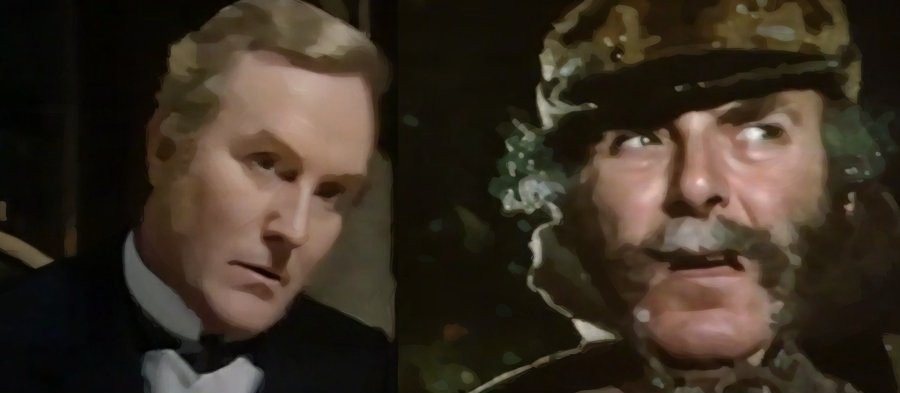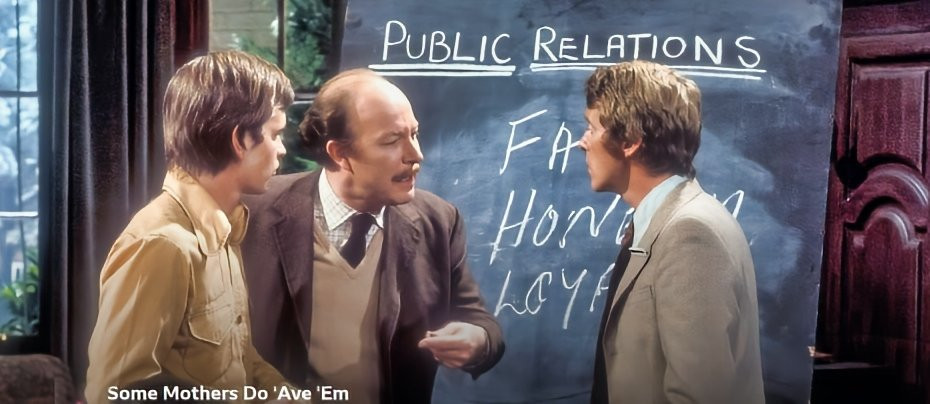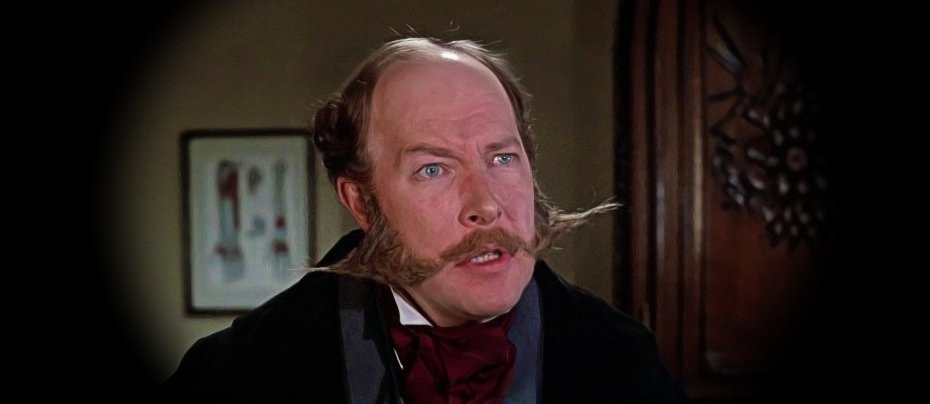
James Cossins
Article by Brian Slade
Character actors came in various guises. Some were jobbing actors before eventually becoming known for one specific role. But then there are others who rarely become known by name, but whenever they do appear, the recognition takes the form of a variation of, ‘That’s that bloke who played that guy in the other thing.’ It’s a tough life in some ways, and one such actor who people recognise without being able to assign a name can still be seen regularly on television, especially while Fawlty Towers and Some Mothers Do ‘Ave ‘Em are repeated – James Cossins.
Born in Beckenham, Kent in 1933, James Cossins took a pretty traditional route into acting, earning the Silver Medal at RADA after his conventional education at the City of London School and a brief stay in the RAF. The inevitable ‘hard graft’ of repertory work followed for some years before his earliest breakthrough, The Long and the Short and the Tall, his first professional production in Nottingham in 1958. His next big hit, Celebration, took him to the West End in 1961.
Cossins’ pre-television career continued to be a success in heavyweight areas, playing in the dual programme of Plays for England and Spring Awakening, which when added to his Shakespearean successes at the Bristol Old Vic, all suggested a starring career lay ahead.
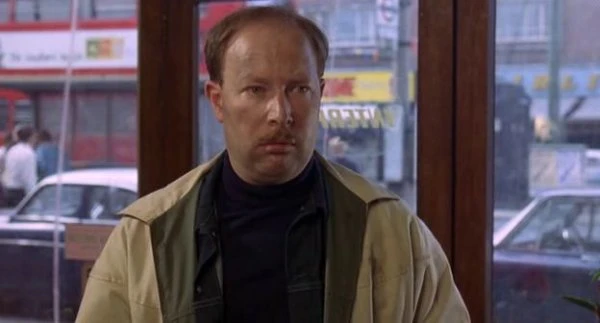
In 1965 he made his first big-screen appearance, in John Schlesinger’s Darling, a swinging sixties success starring Dirk Bogarde and Julie Christie. To this point, his only television success had been on the BBC’s 1960s early evening soap opera, Compact, with a recurring role as Newcastle Pope. It was arguably his most lengthy television success, given that his recurring appearances in Z Cars were as different characters across many years, and his work in the short-lived Pretenders production was for his vocal talents rather than on-screen appearances.
One of Cossins’ most successful stage roles would lead to arguably his most notable movie success. Having played Henry Taggart in a West End Production of The Anniversary, he was chosen to replicate the role in the 1968 movie production where stage lead Mona Washbourne was replaced by Hollywood royalty Bette Davis as the evil domineering widow who expects her three sons to dance to her tune if they wish to remain in the family fortune. This includes Cossins’ Henry, a subservient transvestite – a far cry from the stiff and starchy figure of authority that some of his television screens would bring to our living rooms.
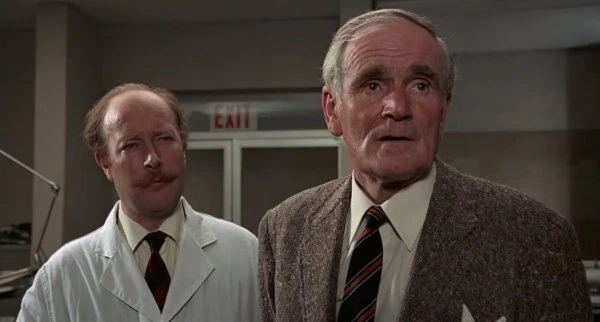
Cossins would scatter his brief one-episode appearances on television liberally between serious and comedic roles. Look closely enough and fans of British comedy will find him in successes like Bless This House and The Rise of Michael Rimmer amongst his many more serious roles. But in 1973, he was cast in a one-episode role that brought the best out of Michael Crawford in a classic episode of Some Mothers Do ‘Ave ‘Em. With Frank seemingly unable to hold down a job and short on confidence, he and Betty decide that he would benefit from a live-in course in public relations. This is run by Mr Watson, a pompous man worshipped by his assistant and vehemently believing in the rhetoric that he taught. Unfortunately for him, he hadn’t bargained on Frank Spencer and some rebellious students.
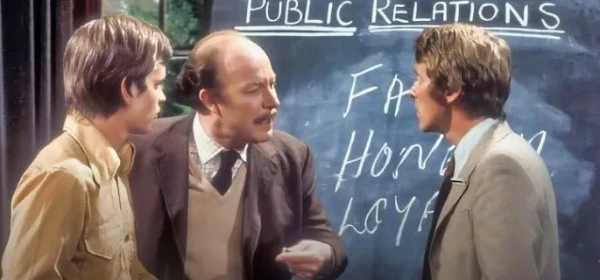
As Frank, as usual, unwittingly makes enemies amongst his classmates, he eventually brings Watson to his knees. He destroys the canteen’s self-serve area (‘can’t have beans…gives me trouble’), causes a punch-up in the dormitory and drives everybody wild with his attempts to work out what a public relations officer does that begins with ‘p’. Frank eventually brings the episode to a chaotic conclusion as he engages in role-playing as an unhappy customer challenging a holiday rep, played by Watson, to display how a public relations officer should behave. As Crawford contorts his face before unleashing a torrent of abuse Watson’s way (all from phrases learned from his classmates), Cossins is superb in maintaining his dignity and then exploding.
Two years after his entanglement with Frank Spencer, Cossins moved onto another of the great 1970s comedy characters as he played Mr Walt, a man who has made the mistake of being a guest at Fawlty Towers, a bad enough decision in any normal circumstance, but even worse when Basil is in paranoid mode as he dreads the arrival of a hotel inspector. While Basil fawns over Bernard Cribbins’ character, Mr Hutchinson, mistakenly believing him to be an incognito inspector, he eventually changes the target of his mistake to Walt, and his brief scene exchanging inaccurate comments about red wine remain Basil at his excruciating best.
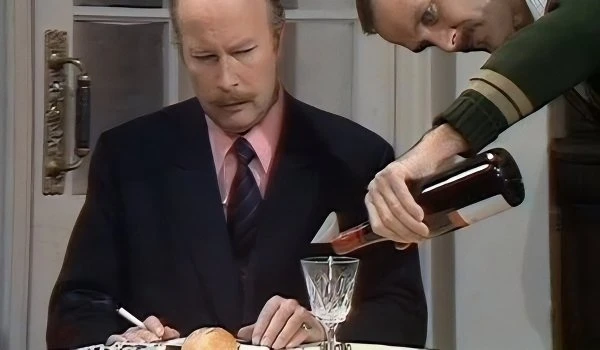
Cossins’ roles were not always in the finest of British television. Goodnight and God Bless was a failed series for ITV about a largely despised quiz show host, and he had a recurring role in a rare misfire from Richard Briers, All in Good Faith. But he was always in demand for his look of gravitas and quality performances.
It’s hard to believe that somebody who appeared in two of Britain’s most memorable sitcoms, starred alongside Bette Davis and appeared in heavyweight films like Gandhi would be difficult to place, but these are the perils of the character actor. Cossins died at the relatively early age of 63 and the later years of his career had minimal activity due to ill health. Perhaps with the advantage of a longer career, he might have been afforded the praise that his stoic seriousness warranted. But if nothing else, his battles with Messrs Spencer and Fawlty will always leave us remembering his contribution to British comedy.
Published on February 25th, 2025. Written by Brian Slade for Television Heaven.








